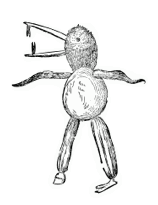The first line of yours that amazed me was "First you will fall in love with what you don't understand. The baby ram butts the shiny tractor." Do you think your poems are defined by misunderstanding?
I think they're very much about misunderstanding. There's that old writer's truism, "Write what you know"—well, you don't know very much. I think to tie meaning too closely to understanding misses the point. In graduate school, nobody understood what I was saying, and I didn't have a clue either. So, I wrote my first book to be understood, to be accepted. I got my father's ghost off my back. I got a job. I wasn't in graduate school anymore. And I realized that the poems in the first book weren't by me—they were instilled in my head. And that not being understood, not being accepted, was my subject.
In your forthcoming book, Skid, I was surprised to discover a sadness, even an edginess to the imagery, as in "You know not to hit the brakes on ice / but do anyway. You bend the nail / but keep hammering because / hammering makes the world."
I think my first two books were relatively austere. In the following books, I tried to work toward celebration and joy and goofiness. But life conspires against you, hands you tragedy, proves that nothing can last. I think all of that is more apparent in Skid than it was in First Course in Turbulence.
In "Blue Garden" you write, "A poem should be / a noise and then it should shut up," which made me think about the brevity of lyric intensity. Do you think of poems as offering a kind of psychic burst?
Well, we spend so much of our time like dumb animals. Our psychology is a little bit flat, and we're consumed with the materiality of life: maintaining our bodies, getting things done, going here, going there. But then, when these portals of almost clairvoyant empathy open up for us, they're amazing. That's what we look for in art—the moment when something comes rushing in. All you have to do is make yourself available, accessible, perhaps in ways you haven't done before. Of course, you can't live in that state. There are also long periods when you can't find it, and they're terrible. They're like being in a desert. Everything you read just plays across your eyeballs.
Are there poets whose work gets you into that state?
Some of the French Surrealists do it for me, as well as Tomaz Salamun, O'Hara, Lorca—poets whose vitality reminds me of the great joy of being able to make art, even when it's about terrible things.
What about a poet like Paul Celan?
Celan's poetry is a black hole for me. As the language of his poems becomes both more and more fractured and compact, it feels like less and less can escape. I admire that level of psychic concentration, but it's something I don't go to. I would pick up Keats or Hopkins before Celan, or Emily Dickinson. Emily Dickinson gives me a headache! There's definitely a greatness there, and something about the language is totally engaging—but finally, it doesn't sustain me. Remember how Ashbery's "Three Poems," begins with something like, "I realized that I could either leave everything out or put everything in"? I want to put everything in. The critiques of representation, the critiques of manifestations of the self, the materiality of language—I look at all that stuff as opening up opportunities for shimmer and wobble, not as a form of negation. And, I'm constantly getting involved in meat.
Meat?
Yeah, meat, and parasols, and my cat.
To read the rest of this interview, please click here to purchase JUBILAT 4



